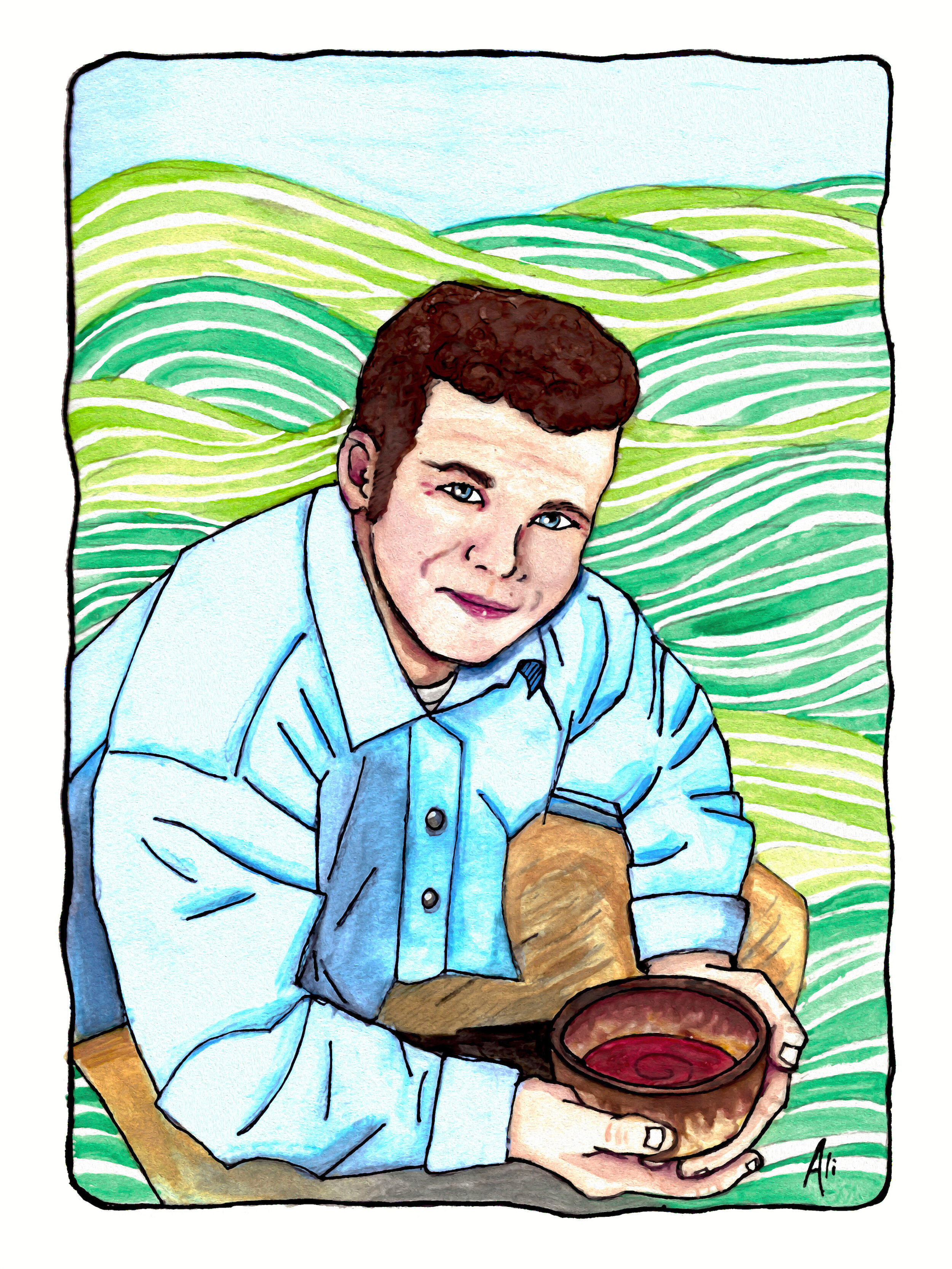The following is a sample profile from the book Holy Troublemakers & Unconventional Saints by Daneen Akers.
Herb Montgomery
Nine-year-old Herb Montgomery and his mother sit in rapt attention, watching a television show called Praise the Lord (“PTL,” for short). A popular preacher, Jim Bakker, hosts the show. Bakker interviews Christian celebrities and preaches a very conservative version of evangelical Christianity. The year is 1985, and this show is frequently on in Herb’s house. Herb’s parents work behind the scenes on the show—his step-dad is a camera operator and his mother is a make-up artist. His family knows everyone who is part of the show’s production, and Herb plays on the set all the time.
Suddenly, Preacher Jim looks directly into the camera and says, “The Lord is impressing me that there is a young man today who is home from school and watching the show. That young man is going to grow up to be a mighty missionary for God.”
Herb’s mother turns to look at Herb, with wide eyes. “Son, he’s talking about you!” she says.
Illustration by Ali Montgomery
Although Herb isn’t so sure, his mother needs no more convincing. From that moment on, in his mother’s eyes, Herb is going to be a missionary and preacher.
When PTL ended a few years later, in the middle of a scandal that sent Jim Bakker to prison, Herb’s mother was devastated. She couldn’t believe that Jim Bakker had been taking people’s donations and misusing them, but there was no doubt he had been. Herb was a teenager then, and he wanted to have nothing more to do with Christianity.
But shortly after this, while in his grandmother’s attic in West Virginia, Herb came across some Bible studies about the New Testament book of Revelation. These studies painted a vivid picture of a violent end of the world that was coming soon, and this led Herb and his mother to join a very conservative church. Within a few years, Herb became the preacher his mother had always hoped he would be. Herb traveled all over the world preaching at churches, school week-of-prayer meetings, and other religious gatherings. His message was one of God’s love and grace but was still within the boundaries of what a conservative church audience expected to hear. He wrote a successful book and was in high demand as a visiting speaker. His preaching schedule was booked months, and even years, in advance. Yet something didn’t feel right to Herb.
Then, one day in 2012, Herb had an “Aha moment” that would dramatically change the message of his teaching. For some time, Herb had been questioning the Christian teaching called “atonement.” This teaching is based on the belief that God is distant from people because their sins make God angry. Very angry. Atonement says that, in order to calm God’s anger down, Jesus had to die on the cross. The people who accept Jesus’s death as a payment for their sins can be reconciled to God, or at-one-with, God. This is still a commonly taught belief in many Christian churches.
But Herb’s Aha moment came because he suddenly realized that this commonly taught idea about atonement was actually violent and harmful. How could a loving God require a violent death? And, as long as people believed in a God that required a violent death in order to forgive them, then people were going to feel justified in treating each other with violence, too.
Herb began reading all he could. It turns out that conversations about the atonement had been going on in Christian circles for hundreds of years, all the way back to the early Christians. A wide range of Christian beliefs about atonement exist, even today. In fact, the man who wrote the few verses of the Christian scriptures that can seem to teach that Jesus had to die on the cross to appease an angry God was Paul, someone who never actually met Jesus. The more Herb learned about a concept called nonviolence, the more his questions about atonement made sense.
For Herb, nonviolence is about looking at everything through the lens of Jesus’s teachings. “Christians are Christians because they believe that Jesus is the divine revelation of God,” Herb says. That means that while the words in the Bible can provide guidance, they aren’t meant to take the place of Jesus. If something doesn’t seem like something that Jesus would say or do, then it needs to be re-evaluated. The formal term for this is a Christological hermeneutic, and it just means that you filter everything first through the life and teachings of Jesus. Does a belief or practice measure up to the ideas Jesus preached in the Sermon on the Mount? Does it love our neighbors? Does it see God in the least of these? If the answer is no, then maybe we need to re-examine that belief or practice.
Herb began sharing his new understanding about Jesus, God, and nonviolence. He now teaches that Jesus didn’t come here to die. He came to show us how to live. It’s not the death of Jesus that saves us; it’s his teachings. “What if Jesus’s death wasn’t the point?” Herb now asks. “What if Jesus died, not because he had to save us from an angry God, but simply because he stood up to the status quo?”
Soon Herb realized that his new understanding of the purpose of Jesus’s life and teachings affected his thinking on many other things.
He saw how most Christian churches had hurt LGBTQ people by rejecting them. He started to see the ongoing harms from sexism, racism, and the systems of sexism and racism. And he began to teach about sharing our resources with each other around a shared table in the way that early Christian communities did. “It was like pulling on a thread of a sweater,” Herb remembers, “Soon the whole thing was coming apart in my hands.”
All of these new insights came from Herb learning about nonviolence. “Learning about nonviolence immediately felt right in the very core of my being,” Herb says. I felt like I was returning home after a very long absence.”
Some people stopped inviting Herb to come to their churches to speak after he had these insights. Donations to the nonprofit he’d started began to drop off. It was a much harder idea for many people to think that Jesus came to teach us how to live rather than the old idea that Jesus simply came to die for us. Many people like to believe that we owe God a cosmic debt for our sin and that, to get a ticket to heaven, you just need to say that you believe that Jesus’s death paid off that debt. “There’s a difference between a gospel about Jesus and the gospel Jesus himself taught,” Herb says. “Jesus teaching about enemy-love and neighbor-love is a lot more challenging for people.”
Following Jesus’s example and teachings is actually much harder than simply believing that he died for our sins. Following Jesus’s teaching today might mean changing how we treat those who are at the margins of our society—refugees, immigrants, LGBTQ people, disabled people, Indigenous people, and people of color. And that is a lot more work. “Jesus was interested in the liberation of all people in the here and now,” Herb says. “That means we all can participate in working to heal our present world, making it a just, safe, and compassionate home for everyone.”
How might you view Jesus differently if you thought he came to show us how to live, instead of coming to die?
Glossary Terms
“Aha” Moment
A moment of sudden insight or inspiration.
Christian/Christianity
A person who practices Christianity, the Abrahamic Religion based on the teachings of Jesus, a first-century Jewish teacher. While there are many different types of Christians who vary widely in belief and practice, all find the life and teachings of Jesus to be of central importance.
Christian Scriptures
The Christian Bible made up of the Hebrew scriptures (or the “Old Testament”) and the New Testament; regarded by Christians as God’s word. The number of books in the Christian Bible varies; for example, the Catholic Bible has more books than most Protestant Bibles, and the Eastern Orthodox Bible looks a bit different still.
Christological Hermeneutic
An interpretation of the Bible that tries to view everything first through the lens of the life and teachings of Jesus. A person following this view tries to make decisions by asking: “Does this policy love our neighbors and seek to serve the least of these?”
Conservative
A person who tends to like things the way they are or the way they have historically been; conservatives work to limit political, theological, and social change.
Evangelical Christianity
A type of Protestant Christian; loosely organized in comparison with Catholics or more formal denominations. The name refers to sharing one’s faith with other people or “evangelizing”; usually evangelicals place a strong emphasis on personal conversion often by saying a simple prayer popularly known as the “sinner’s prayer” that invites Jesus into one’s heart. In the U.S., White evangelicalism has been strongly connected with Conservative social politics since the 1980s.
Indigenous
The original or Native people in a region or country. Indigenous people are descended from the original inhabitants of the land they live on. In the U.S., Indigenous people are usually called “Native Americans.” In Canada, they are called “First Nations” people. Today there are an estimated 370 million Indigenous people in 90 countries who speak 7,000 languages.
LGBTQ
The acronym for Lesbian, Gay, Bisexual, Transgender, and Queer people; other commonly used acronyms for gender and sexual minorities include LGBTQI, LGBTQIA, and LGBTQ+.
Liberation
The act of being freed from hardship, oppression, or imprisonment; gaining equal rights and opportunities.
Missionary
A person who travels to another country to promote a religion, often Christianity.
New Testament
The second part of the Christian Scriptures; written originally in Greek and containing the teachings of Jesus and the writings of Paul and a few other early disciples. A religious council in the 4th century decided which books are currently included in the New Testament.
Nonprofit
An organization that exists in order to support a particular cause and works for that cause rather than for financial gain.
Nonviolence
The use of peaceful activities, not force or violence, to bring about positive change; the goal is always to help the people currently doing harmful things to see how what they are doing is wrong and change, so people are never seen as the enemy but bad, harmful ideas are the enemy.
Saved
An idea in Christianity, especially Evangelical Christianity, that refers to whether a person has accepted Jesus as their personal savior. Like the idea of Salvation, different types of Christians use this term differently; for many Christians featured in this book, Jesus’s teachings are what saves us.
Read another sample chapter from the Holy Troublemakers & Unconventional Saints book by Daneen Akers.



